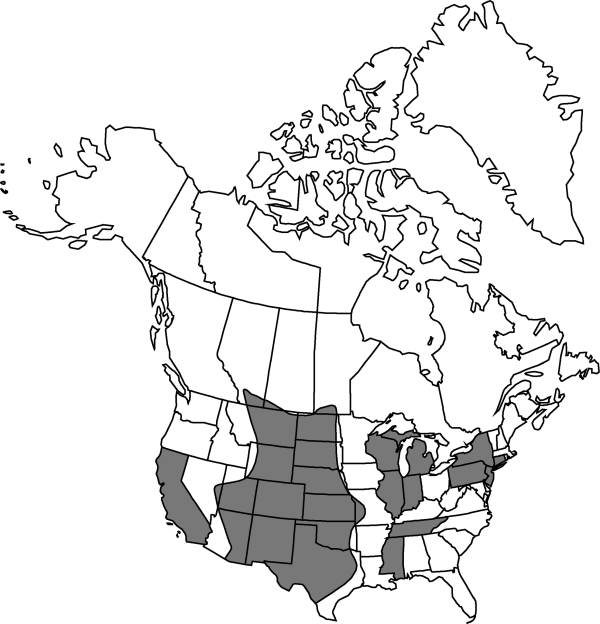Difference between revisions of "Mirabilis linearis"
Annuaire Conserv. Jard. Bot. Gen ève 5: 186. 1901.
FNA>Volume Importer |
FNA>Volume Importer |
(No difference)
| |
Revision as of 22:21, 16 December 2019
Stems decumbent, ascending, or erect, sparsely leafy with few stems to very leafy and bushy branched, leafy primarily in proximal 1/5 to throughout, 1–1.3 dm, basally minutely puberulent in 2 lines, sparsely or densely spreading-hirsute, or rarely glabrate or glabrous; distally minutely puberulent in 2 lines, sparsely or densely spreading-hirsute, or rarely glabrate or glabrous, usually glandular-puberulent or pubescent in inflorescence. Leaves strongly ascending to spreading at 5–80°; petiole 0–1.5 cm; blade green to blue-gray and glaucous, linear to linear-lanceolate, rarely lanceolate, 3–11.5 × 0.1–1(–1.8) cm, thin to fleshy, thick, and succulent, base long attenuate or narrowly acute, apex acutely tapered to rounded, surfaces glabrous, glandular-pubescent, or hirsute. Inflorescences axillary and terminal, when axillary, consisting of single involucres or short branches, when terminal with ± well-defined central axis and shorter side branches, or narrowly to widely forked without main axis; peduncle 3–10 mm, usually spreading glandular-puberulent or pilose, crosswalls of hairs pale or dark; involucres pale green, sometimes tinged with purple, narrowly to widely bell-shaped, 3–6 mm in flower, 4–10(–15) mm in fruit, spreading viscid-pubescent to hirsute, 40–70% connate, lobes ovate. Flowers 3 per involucre; perianth white to purple-pink, 0.7–1.1 cm. Fruits olive brown or dark olive brown, narrowly obovate and tapering at both ends to obovoid, 3.1–5.5 mm, pubescent with spreading crinkled hairs in tufts or ± evenly distributed, hairs 0.1–0.5 mm; ribs sometimes slightly paler, slightly elevated above surface (usually less than 0.5 times as wide as high), low rounded to round-angled, 0.5–1 times width of sulci, 0.3–1 times as wide as high, smooth throughout or sometimes rugose on sides, occasionally interrupted and tuberculate near apex; sulci with small or rarely large tubercles, or low and inconspicuous or occasionally high and prominently cross-rugose.
Distribution

North America, n Mexico.
Discussion
Varieties 3 (3 in the flora).
Selected References
None.
Lower Taxa
Key
| 1 | Stems hirsute, at least basally | Mirabilis linearis var. subhispida |
| 1 | Stems minutely puberulent, glabrate, or glabrous basally | > 2 |
| 2 | Leaf blades linear, grayish or bluish green; perianth white to deep rose-pink | Mirabilis linearis var. linearis |
| 2 | Leaf blades linear-lanceolate to lanceolate, green; perianth pink to deep purple-pink | Mirabilis linearis var. decipiens |